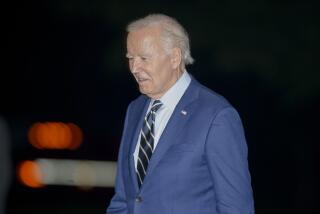Clinton Meets With Rabin, Praises the Peace Process : Diplomacy: He tries to neutralize Bush’s advantage in foreign policy without appearing to damage negotiations with partisan politics.
- Share via
WASHINGTON — Democratic presidential candidate Bill Clinton again sought to neutralize President Bush’s advantage in foreign policy Wednesday, meeting with Israeli Prime Minister Yitzhak Rabin and stressing that the November election should not be allowed to interfere in the Middle East peace process.
Bush strategists believe the President’s long experience in foreign policy is perhaps his greatest strength in the contest with Clinton. To combat that, Clinton and his advisers generally have tried to imitate a boxer in a clinch--staying close to Bush to prevent him from landing a strong blow while occasionally stepping back to jab when the President drops his guard.
On the Middle East, for example, Clinton has been careful to praise the peace process, insist that he would pursue it if elected and suggest that any attempt to take partisan advantage of the issue might hurt the negotiations. That is a posture seemingly designed to warn Bush against trying to use the negotiations to score political points.
Clinton, speaking to reporters after his meeting with Rabin, said he had told the Israeli leader of his “intense desire not to let partisan difficulties with the election here in the United States have any impact at all on the peace process in the Middle East.”
“There would be complete continuity in that process after the election if I won,” he said.
Later, during an interview with reporters and editors of USA Today, Clinton said he had begun planning for a presidential transition in case he did win. He cautioned that he has “tried to low-key” those efforts to avoid seeming overconfident.
A new poll gave him reason for optimism about his prospects. The ABC News-Washington Post survey showed him with a 26-percentage-point lead over Bush, maintaining the huge margin he achieved in the wake of last month’s Democratic Convention.
The poll showed Clinton with 60% support, compared to 34% for Bush. The telephone survey of 720 registered voters taken Aug. 7-11 had a margin of error of 4.5 percentage points.
In the USA Today interview, Clinton said he had asked a small group of advisers to begin thinking about how a future White House might be staffed, how members of his Cabinet should be selected and what should be done to put a new Administration in working order.
Clinton added he has asked a second group of advisers to prepare more detailed legislative proposals to flesh out his general policies on areas such as health care. “There is an agenda out there,” he said, but several areas, particularly national health coverage, are “very complicated” and need attention to detail.
Of the issues he might face in a transition if he does win, foreign policy is the one in which Clinton has the least experience. But he consistently has argued that voters will not hold that against him.
Moreover, Clinton advisers believe, the end of the Cold War has made voters less worried about turning the presidency over to a person without extensive experience in the foreign arena.
Still, meetings like Wednesday’s session with Rabin play an important role in the Clinton campaign, giving him an opportunity to be seen by voters rubbing shoulders with world leaders--part of the process of overcoming a chief hurdle facing all presidential challengers, which is getting Americans to begin seeing them as their leader.
As he has attempted to bolster his foreign policy credentials, Clinton occasionally has been willing to criticize the President.
In recent weeks, for example, he contended Bush was not doing enough to bring a stop to the killing in Bosnia. He also sharply attacked Bush’s policies toward Iraq in the period leading up to the Persian Gulf War, at one point accusing the President of having followed a policy of “appeasement” toward Saddam Hussein during that time.
Earlier in the campaign, Clinton criticized Bush for refusing to grant loan guarantees that Israel had sought to help pay for the resettlement of Jewish refugees from Russia and other parts of the former Soviet Union. The Administration’s loan guarantee policy was widely unpopular among supporters of Israel.
Now that Rabin’s election has opened the way for Bush to approve the guarantees, Clinton played down that criticism Wednesday, saying in response to a question that all parties to the peace process should now try to “look forward” rather than revisit past issues.
More to Read
Sign up for Essential California
The most important California stories and recommendations in your inbox every morning.
You may occasionally receive promotional content from the Los Angeles Times.














